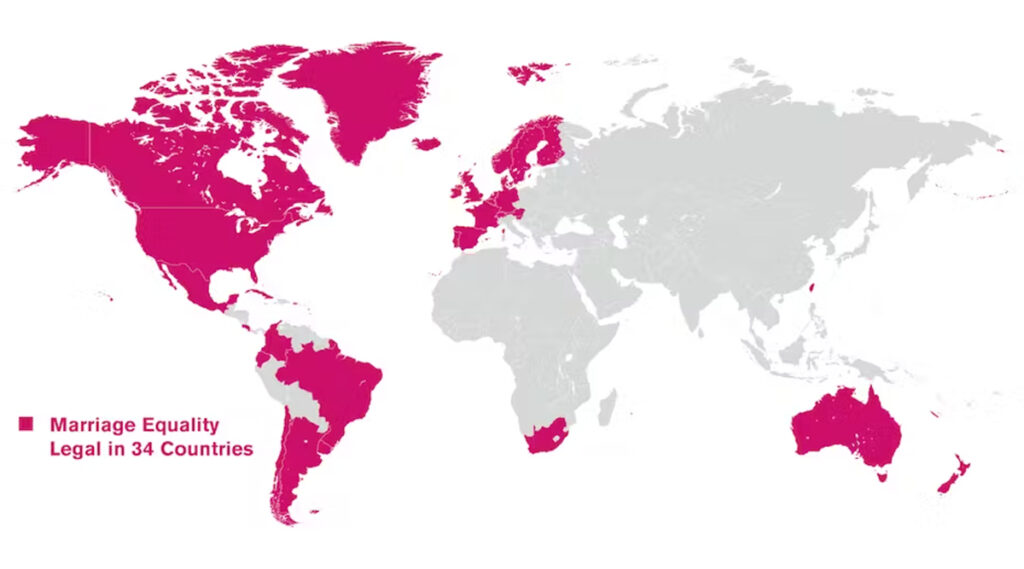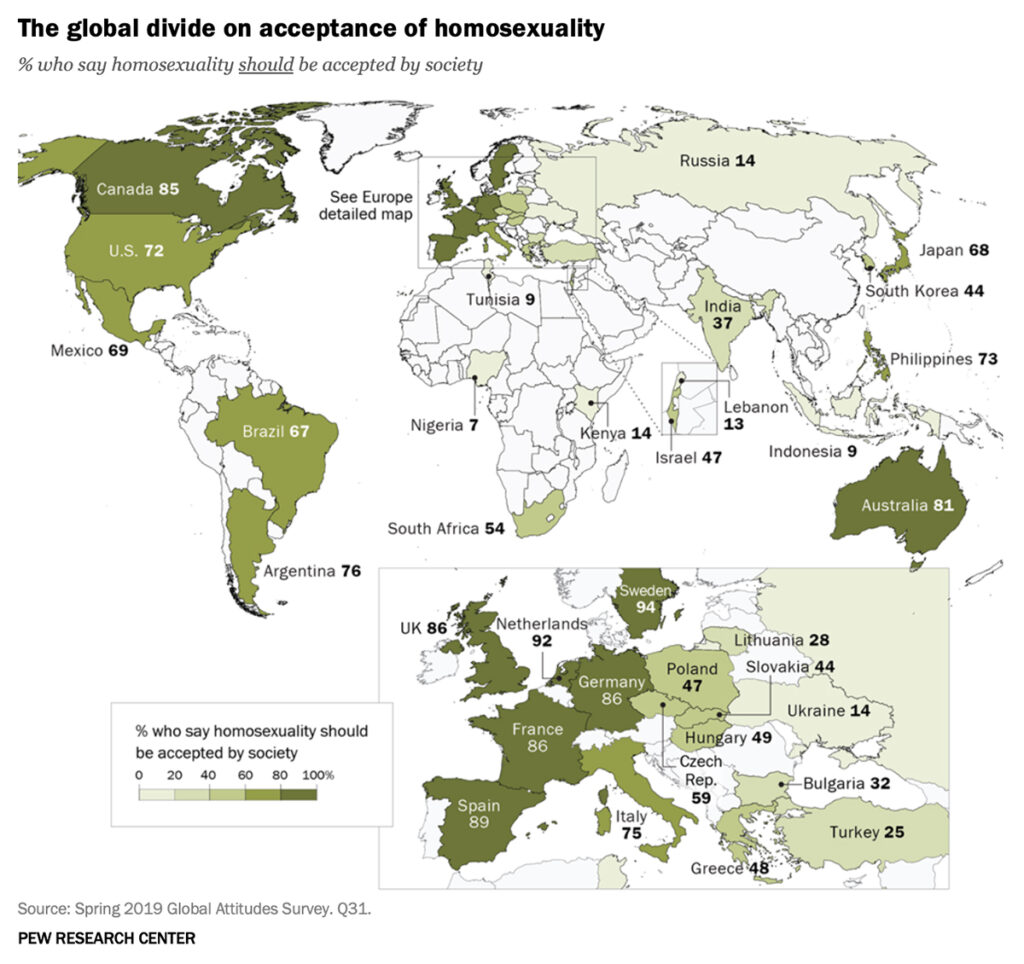Volcanoes are erupting in The Philippines, but on-fire Australia received some welcome rain. The Iran war cries have been called off and The Donald’s military powers are about to be hamstrung by the Senate. Meanwhile, his impeachment trial is starting, and we’re all on Twitter for a front-row seat.
What Could Go Right? 7 pieces of equal-rights progress
Same-sex marriage legislation is advancing in Asia and Eastern Europe.
This is our weekly newsletter, What Could Go Right? Sign up here to receive it in your inbox every Thursday at 5am ET. You can read past issues here.
7 pieces of equal-rights progress
One piece of feedback about this newsletter that we receive more than I would have expected is a request to cover LGBTQ issues less often. That request could be coming from a variety of places. But I do wonder if it’s sometimes because those of us living in the 34 countries where same-sex marriage is legal—to use that as an imperfect proxy for LGBTQ rights generally—forget that we are global outliers.

That’s not to say that life for LGBTQ people in these more progressive countries is idyllic, and of course big variations in rights and attitudes exist across them. But most LGBTQ people in the world are operating in environments closer to, and in many cases much worse than, the one in Greece, where I live, for example.
Here, only 48 percent say homosexuality should be accepted by society. The country’s first openly gay political leader was announced last month. He received society-wide blowback, including from within his own party. Don’t ask me how common it is to use derogatory terms for gay people in everyday conversation.
So that’s what I have in mind when I include LGBTQ issues in the newsletter. In the case of the world vs. equal rights for all, we are far from resolution.

Progress, however, is inching forward in a variety of places. In Greece, the center-right government has put same-sex marriage on the table for discussion, although there hasn’t been concrete action yet. And today I’d like to highlight some other notable goings-on for LGBTQ rights, many of which are in Asia.
Same-sex couples in Taiwan can now adopt children. In May, Taiwan updated a law that limited adoption of children by same-sex couples to those biologically related to one partner. Now same-sex couples can adopt under the same rules as heterosexual couples. Same-sex marriage was legalized in 2019.
The Czech Republic may legalize same-sex marriage soon. A bill, supported by both parties, was introduced in May, passed a first round of approval in June, and is now being considered by governmental committees before it will be sent to the Czech Senate.
Nepal’s Supreme court ordered the government to register same-sex marriages. The court’s June order is temporary but still active, while the country awaits legislation from the government to legalize same-sex marriage for good.
Same-sex marriage will become legal in Estonia on January 1, 2024. The legislation was approved in June and will become active in the new year, making Estonia the first Baltic country and the 35th globally with marriage equality. Neighboring Latvia recognizes same-sex civil unions but not marriage; Lithuania recognizes neither.
Hong Kong’s top court gave the government two years to form a framework for the protection of social rights. While the court, in September, did not find that same-sex couples have a constitutional right to marriage, it did order the creation of an alternative legal framework to meet “basic social requirements” for them.
Thailand is (re)considering same-sex marriage. The coalition government’s cabinet is reviewing a bill, which includes provisions for adopting children and inheriting properties, this week. If approved, it will be sent to Thailand’s parliament in December, where it will go through three “readings.” If the bill passes, Thailand will become the first Southeast Asian nation to legalize same-sex marriage. A similar bill passed a first parliamentary reading in early summer, but was set aside during election season. The new one is stronger than the first in that it legalizes same-sex marriage, not just civil partnerships.
Moving from same-sex marriage and family rights to transgender ones, in Japan, courts are reconsidering requirements for legal gender transition.
Japan’s Supreme Court deemed mandatory sterilization for transgender people unconstitutional. Last week, Japan’s 15 justices ruled unanimously to remove surgical sterilization as a requirement for legal gender transition. Transgender people in Japan must still receive a psychiatric evaluation and be single and without children under 18 in order to legally transition. Another requirement, having “a physical form that is endowed with genitalia that closely resemble the physical form of an alternative gender,” has been sent to a lower court for scrutiny.
Quick hits
- Two weeks ago I shared podcaster Coleman Hughes’ interview with Israeli scholar Dr. Benny Morris. He has a new one up now with Palestinian-American writer Yousef Munayyer. I found both educational.
Below in the links section, wireless EV charging at traffic lights, gene therapy for deafness, Florida man school district bans cellphones, and more.

Americans Deserve a Better Political System

Ideas for increasing civic pluralism, rebooting institutional independence, and building a better media | Read more
What Could Go Right? S5 E5

Who is going to work these days and who is staying home? How should schools handle cell phones on their grounds, and what is the UK doing about them in particular? And what did NASA scientists find in their latest asteroid sample? Zachary Karabell and Emma Varvaloucas are back to discuss the latest news stories we might have missed. | Listen to the episode
Progress, Please
(Found good news? Tweet at us @progressntwrk or email.)
Other good stuff in the news 🐬
Energy & Environment:
- Uruguay’s power grid runs on 98% green energy. Here’s how it got there | NPR
- How Europe’s disused coal mines are successfully being used to heat our homes | Euronews
- This Japanese city is piloting EV wireless charging at traffic lights | Electrek
- ‘There’s still beauty’: a national park bounces back after California’s biggest single fire | The Guardian
- 11 nations sign declaration to save rare river dolphins | Khmer Times
Public Health:
- First malaria vaccine slashes early childhood mortality | Science
- Some deaf children in China can hear after gene treatment | MIT Technology Review
- What is behind the unexpected decline in dementia? | Financial Times
Science & Tech:
- In Gaza, a nonprofit 3D prints tourniquets and stethoscopes | STAT News
- Green solar energy beamed from space may soon be cheap and plentiful | Newsweek
Politics & Policy:
- New federal program puts $12M toward school integration in a dozen states | Chalkbeat
- Czech government plans coal phase-out by 2033 and oil and gas by 2050 | Euractiv
- UK ministers to scrap IVF laws denying access to people with HIV | The Guardian
Society & Culture:
- Criminal justice reform is helping to lower incarceration rates for black men and women | The 19th
- This Florida school district banned cellphones. Here’s what happened | The New York Times
- The world has made substantial progress in increasing basic levels of education | Our World in Data
Economy:
- Great news about American wealth | Noahpinion
- US economy sizzles in Q3, defying slowdown fears | Axios
- Have US workers gotten a raise? | Brookings
- Equitable recovery in the US | Axios
TPN Member originals 🧠
(Who are our Members? Get to know them.)
Israel-Palestine:
- The ultimate condescension toward Palestinians | John McWhorter
- From the Six-Day War to the Six-Front War | Thomas L. Friedman
- Israel, it’s time to consider a cease-fire | Thomas L. Friedman
- Searching for humanity in the Middle East | David Brooks
- Israel’s Gaza speech code | Robert Wright
The Rest:
- Trump’s associates plead guilty in Georgia | Isaac Saul
- Mississippi immortalizes a lost moment of desegregation | Deborah Fallows
- I love candy. But does it make me happy? | Arthur C. Brooks
- Johan Norberg on the case for capitalism—and the myth of Swedish socialism | James Pethokoukis
- Knowing others (and ourselves) | David Brooks & Yascha Mounk
- The Netflix Effect | Scott Galloway
- Do voters like moderate messages more? | Matthew Yglesias
Department of Ideas 💡
(A staff recommendation guaranteed to give your brain some food for thought.)
Is social media making us into a group mind? | The Intrinsic Perspective
Why we picked it: If we accept that the formation of a “group mind” is possible, is there a better (potential) example of an active one to observe than social media? And would becoming a part of that group mind “accidentally at a civilization level (such as being forced into it via technological changes),” as the essay’s author, Erik Hoel, writes, necessarily be a bad thing? —Brian Leli
Until Next Time
What do an 18th-century haberdasher, engraver, hair worker, toy manufacturer, linen draper, cabinet maker, and upholsterer all have in common? You guessed it. British biscuit art.


